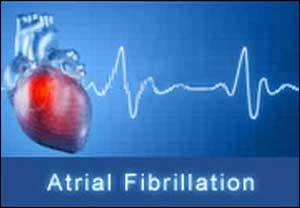- Home
- Editorial
- News
- Practice Guidelines
- Anesthesiology Guidelines
- Cancer Guidelines
- Cardiac Sciences Guidelines
- Critical Care Guidelines
- Dentistry Guidelines
- Dermatology Guidelines
- Diabetes and Endo Guidelines
- Diagnostics Guidelines
- ENT Guidelines
- Featured Practice Guidelines
- Gastroenterology Guidelines
- Geriatrics Guidelines
- Medicine Guidelines
- Nephrology Guidelines
- Neurosciences Guidelines
- Obs and Gynae Guidelines
- Ophthalmology Guidelines
- Orthopaedics Guidelines
- Paediatrics Guidelines
- Psychiatry Guidelines
- Pulmonology Guidelines
- Radiology Guidelines
- Surgery Guidelines
- Urology Guidelines
Catheter Ablation found better than Pharmacological Therapies in atrial fibrillation

The medical community has long debated the ideal treatment for atrial fibrillation (AF), especially for patients suffering from left ventricular dysfunction and until now, no clinical studies have been conducted that support one definitive treatment. According to new study patients receiving radiofrequency catheter ablation had significantly lower hospitalization and mortality rates as compared to traditional drug therapies for atrial fibrillation (AF). The findings have been published in the New England Journal of Medicine.
“Atrial fibrillation prevents the heart from filling and pumping properly,” begins Nassir F. Marrouche, M.D., professor in Internal Medicine and Executive Director of the Comprehensive Arrhythmia Research and Management (CARMA) Center at University of Utah Health. “When the heart is not synchronized, it hastens heart failure and increases the risk of stroke.”
“None of the traditional drug therapies are improving the patient’s condition, a major medical dilemma when we see these patients in our clinics,” Marrouche said.
Marrouche and colleagues at the U of U Health and Klinikum Coburg, Germany conducted the eight-year CASTLE-AF clinical trial to compare catheter ablation to conventional drug therapies recommended by the American Heart Association and European Heart Society to control the heart’s rate.
Patients from North America, Europe and Australia with heart failure and a history of symptomatic atrial fibrillation were screened for the study. The research team selected 363 participants, characterized by heart function at less than 35 percent capacity, for the clinical trial. The patients were separated into two groups, receiving either radiofrequency catheter ablation (179) or a conventional drug therapy (184).
The clinical trial’s endpoint was set at all-cause mortality and worsening of heart failure, resulting in an unplanned overnight hospitalization. Patients in the ablation group experienced lower overall mortality (28%; 51/179) compared to the medication group (45%; 82/184). In addition, catheter ablation resulted in lower cardiovascular mortality (13%; 24/179) compared to the medication group (25%; 46/184).
The ablation procedure aims to isolate all pulmonary veins and to restore regular heart rhythm. In the clinical trial, ablation lesions were made at the discretion of the operators using their preferred ablation system.
During the ablation process, a catheter is snaked through the patient’s body to the site of abnormal heart cells. The doctor delivers a dose of radiofrequency energy, similar to microwaves, to destroy the abnormal cells, which restores the heart’s regular rhythm.
“The CASTLE-AF clinical trial represents a landmark in the history of cardiovascular medicine because of its potential impact on our patients who are suffering from heart failure,” said James Fang, M.D., Chief of Cardiovascular Medicine at the University of Utah Health. “For the first time in a randomized study, the strategy of catheter ablation for atrial fibrillation may be better than the current approach for these patients.”
All of the participants included in the CASTLE-AF trial had previously received an implantable cardioverter defibrillator (ICD), which allowed for continuous monitoring of heart rate. The ICD may have improved outcomes. Marrouche believes this is the primary limitation of the study and may have affected death rates in both groups.
“This clinical trial is the first time we can show with hard data that ablation is saving more lives than arrhythmia medications,” said Marrouche. “It also lowers the cost of treating patients by keeping them out of hospital due to lower incidence of worsening heart failure.”

Disclaimer: This site is primarily intended for healthcare professionals. Any content/information on this website does not replace the advice of medical and/or health professionals and should not be construed as medical/diagnostic advice/endorsement or prescription. Use of this site is subject to our terms of use, privacy policy, advertisement policy. © 2020 Minerva Medical Treatment Pvt Ltd